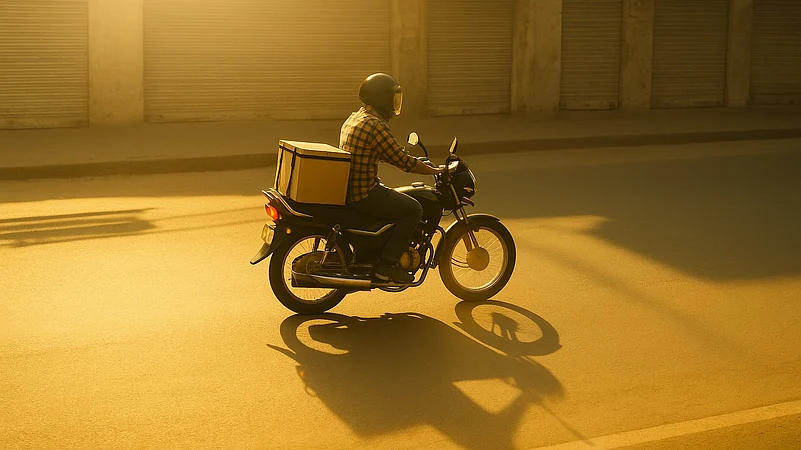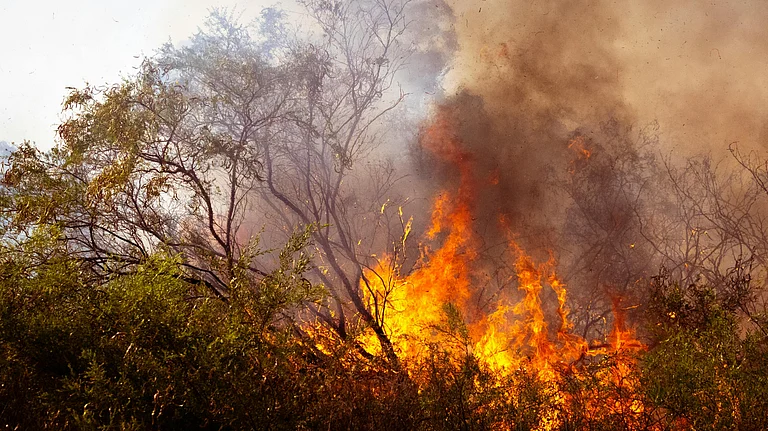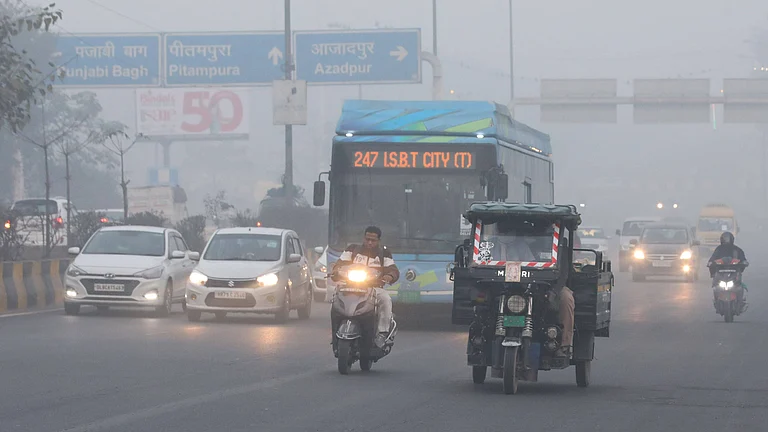After weeks of erratic and unexpected rains and dust storms across India that brought with it some relief, scorching heat and extreme humidity are again the talk of the town.
According to the annual environment report by the Ministry of Statistics and Programme Implementation (MoSPI), the annual mean temperature in India reached a 24-year high by rising 0.7 degrees Celsius to 25.74 degrees Celsius between 2001 and 2024.
Even if the planet gets warmer by a number as small as half a degree Celsius, it makes extreme weather events more intense and more frequent globally, according to Climate Change 2021: The Physical Science Basis. Contribution of Working Group I to the Sixth Assessment Report of the Intergovernmental Panel on Climate Change.
The World Meteorological Organisation (WMO) too confirmed on January 10, 2025 that 2024 was “the warmest year on record” that saw exceptional land and sea surface temperatures and ocean heat globally.
Not just that, the India Meteorological Department’s (IMD) official announcement on January 15, 2025 confirmed that the year 2024 was the hottest ever recorded in India. The report also stated that the annual mean land surface air temperature averaged over India during 2024 was +0.65 degrees Celsius above the long-term average (Period 1991-2020). This marked the warmest year since nationwide records began in 1901, surpassing the highest temperature observed in 2016, which had an anomaly of +0.54 degrees Celsius.
Another 2025 Extreme Events & Disasters report by the Ministry of Statistics and Programme Implementation showed that heat stroke was a significant cause of mortality particularly in 2017 and 2022.
IMD’s current data showed that the highest maximum temperature reached 45.3 degrees Celsius in Jaisalmer (West Rajasthan), with above normal temperature ranging between 1.6 degrees Celsius to 3 degrees Celsius at many places over Lakshadweep; at a few places over Arunachal Pradesh, Uttarakhand, Haryana-Chandigarh, Delhi and Vidarbha, and at isolated places over Odisha, Jharkhand, Chhattisgarh, Coastal Andhra Pradesh & Yanam, Rayalaseema, Tamil Nadu, Puducherry & Karaikal and Kerala and Mahe.
IMD also predicted that maximum temperatures are likely to rise by 2-3 degrees Celsius over Northwest and Central India during the next three days. Whereas Delhi’s maximum temperature could touch 45 degrees Celsius with yellow alert in “heat-wave conditions at isolated places” on June 9 and 10, stated IMD. On June 8, the maximum temperature in Delhi was recorded between 42 and 44 degrees Celsius, which was above normal. These temperatures are expected to rise by 3 degrees Celsius in the next three days. Due to such conditions, IMD predicted that the heat wave conditions could continue till June 11.
Extreme temperatures become especially dangerous for people who must work outdoors—like e-commerce delivery partners—who are on the frontlines during extreme heat conditions. They are toiling day in and day out under the blazing sun and even at night where remnant hot winds keep blowing accompanied by high humidity that could easily take a toll on human life.
The pertinent question to ask here is: are the e-commerce platforms concerned about the lives of the delivery partners that are working during these conditions to ensure seamless operations for them.
E-Commerce Firms Respond Proactively
Commenting on the rising temperatures across the country and the well-being of delivery associates and partners, a Flipkart spokesperson highlighted that it is important for the e-commerce ecosystem to take proactive steps. “At Flipkart, we have implemented multiple measures to help our delivery partners and associates navigate the summer season safely. This includes providing hydration support with ORS, glucose, buttermilk, and citrus juice, along with water tables across shift break zones,” the spokesperson said.
The company has also set up cooling zones with fans, air desert mist coolers and chiller pads at key locations to ensure comfort, with frequent checks on the serviceability of all coolers and cold water dispensers.
“To support their well-being, periodic health checks are conducted, provide training on heat stroke awareness and first aid, and offer flexible break schedules. Daily huddles focus on hydration awareness and adherence to summer-specific protocols. Our associates also undergo training on handling products in high temperatures and are encouraged to wear light, breathable cotton clothing for comfort. Additionally, we have a contingency plan in place, including temporary shift adjustments and workforce support, to manage extreme heat conditions effectively. These initiatives reflect Flipkart’s broader people-first approach, ensuring a safe and supportive working environment for our delivery partners and associates,” the spokesperson shared.
The hyperlocal delivery provider Zippee has also taken steps to ensure the wellbeing of its delivery partners. Angad Singh of the founding team at Zippee, acknowledged that while completely preventing partners from going outside is unavoidable, the company is mindful of the way deliveries are scheduled. “There are no changes in delivery scheduling per se, but routes are clustered to reduce time on the road, and dispatches are spread more evenly across shifts,” Singh said.
Talking about the measures taken by the company, he shared, “We’ve deployed industrial-grade fans, hydration stations, and cooldown zones across our dark stores. All fleet partners receive hydration kits, and fleet incharges proactively monitor rider fatigue and cooldown intervals in high-heat zones.”
Zippee is providing insurance coverage to its fleet partners and partnering with local clinics for basic medical support and camps during peak summer.
Moreover, the company has issued training advisories through its internal fleet app and communications channel. “Fleet supervisors brief delivery partners regularly on recognising signs of heat stress and the importance of hydration and cooldowns,” Singh mentioned.
Zippee found that exposure to intense heat impacts delivery efficiency, on studying trends to take effective action. “We track rider absenteeism, shift drop-offs, and delivery delays in real time via our central control tower. In NCR, we recorded a 4.5% MoM rise in daily active rider non-compliance in May, partially linked to rising temperatures. In response, we increased cooldown buffers, added hydration checkpoints in key dark store zones, and reinforced field supervision during peak hours,” Singh asserted.
Elaborating on the series of measures rolled out to help their delivery partners stay safe during extreme heat conditions, Vikas Sharma, Chief operating officer (COO), Zepto, said, “This includes distributing hydration supplements (via Fast&Up) and sunscreen sachets (via The Derma Co.) to over 1,00,000 delivery partners, and turning our dark stores into cooling zones with shaded seating, air coolers, clean washrooms and refreshments.”
Zepto also implements slot-based work model to give partners the flexibility to avoid peak heat hours while providing 2X incentive pay to those who choose to work during high-temperature slots. “Thanks to our hyperlocal delivery radius of 1.5–3 km, time spent outdoors is also limited,” he added.
“We provide robust health coverage: ₹1 lakh IPD insurance, ₹10 lakh accidental cover, free video consultations, and discounts on medicines. We also step in with additional financial support for medical needs not covered by insurance,” he added.
To ensure partners are informed and prepared, the company runs regular heat-safety awareness campaigns through app messages, team briefings, and in-person sessions.
“Finally, we continuously assess on-ground conditions through internal audits, which help us adapt—from upgrading store infrastructure to improving work flexibility—so safety always stays ahead of the curve,” he noted.
As global temperatures rise, the food delivery riders also face serious heat exposure problems under extreme urban heat. Talking about the initiatives rolled out by Eternal, the parent company of Zomato, a spokesperson said, “We have doubled down on our ‘Shelters Project’, taking the count of our rest points to 2,500+ across India. Our rest points are equipped with comfortable seating, free drinking water, mobile charging points and clean washroom facilities. These are aimed at supporting the entire gig economy and delivery partners of various companies in between deliveries.”
The company also conducts annual awareness drives that send reminders through partner apps for partners to stay hydrated, along with sending notifications to customers to offer water to delivery partners when they deliver orders. They have also introduced full-sleeve, dry-fit shirts for all delivery partners that ensures the user’s comfort.
“To address any health or medical emergency, an ambulance and 24/7 SOS support are made available in 800+ cities for all delivery partners on-boarded on our platforms, for immediate and prompt assistance if needed. As a policy, all active delivery partners are also insured under IPD cover up to INR 1,00,000 & OPD cover up to INR 5,000 to avail professional medical support at no additional cost to them,” the Eternal spokesperson added.
Much like the other players, the e-commerce giant Amazon is also taking necessary steps to protect its delivery partners from the scorching heat. It is prioritising the health of the delivery partners across its pan-India operations network by providing air-conditioned break rooms apart from installing real-time heat index monitoring at the rest centres. Amazon India has taken a step forward by working on initiatives like Ashray centres, which air-conditioned rest stops offering amenities for all delivery associates, not just those who deliver for Amazon.
“All our facilities are equipped with air-conditioned break rooms and all employees and associates are encouraged to take preventive cool-down breaks as needed, and all teams are empowered to address temperature-related issues. For line-haul and truck drivers coming to our fulfilment centres and sort centres, we provide resting points and have also installed air-cooling systems as needed, ensuring space to rest between long journeys. These resting points also offer shower facilities, cold and hot drinking water and coffee/tea at all times,” an Amazon spokesperson said.
Amazon is taking care of its delivery associates by providing nationwide health camps offering free check-ups, hydration advice and early heat illness detection. The company has launched emergency ambulance support via the Delivery Associate app to ensure timely medical aid on the road. Additionally, the company leverages technology to optimise route planning for analysing weather conditions while seamlessly integrating breaks to enable a better experience for their employees to avoid peak heat hours.
These targeted heat mitigation strategies may provide some respite to the delivery partners, but from a bird’s eye view, it’s every single action against climate change that truly counts.


































